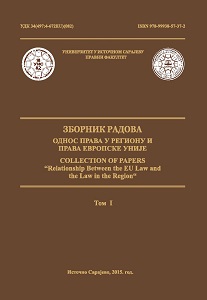Jedinstveni institucionalni okvir Evropske unije
The Single Institutional Framework of the European Union
Author(s): Bojana Lakičević-Đuranović
Subject(s): Social Sciences, Law, Constitution, Jurisprudence
Published by: Правни факултет Универзитета у Источном Сарајеву
Keywords: European Union;Union;Federation;Institutions;Framework; Agreement;System
Summary/Abstract: We have been introduced to the most important institutions of the European Union, and its functions, as well as what makes them distinctive.Although they have more pronounced executive and legislative functions,The Council, the Parliament and the Commission do not belong exclusively to these fields. Namely, the boundary between extremely executive and legislative bodies in the European Union is very interesting. This is precisely what makes the institutional framework of the Union revolutionary. With this system of not clearly distributed powers, we reach a situation where almost none of the above mentioned bodies can perform their functions exclusively– without the consent of some of the other institutions with which they share the authority. As I said, the benefits are obvious; the mutual control between the institutions has been facilitated, the unity of action of the institutions within the Union has been strengthened, as well as the transparency of the work of the institutions.What this system has brought to the Union is a more difficult operation of the institutions, increased bureaucracy, an expanded decision-making apparatus, the necessity of using a large number of procedures in carrying out its functions etc. However, the cause of all this lies in the structure of the European Union, that is, in the very fact that it is a union. The union is an outdated model, which cannot succeed in modern times. The authorities in the Union, in particular such as the European, are too decentralized, and in spite of the existence of central institutions, its members have too much sovereignty. The European Union is now in the most unstable period since its establishment. The state of war in Ukraine has caused tensions between the EU and Russia. While Germany is pulling the reins of influence over the Union, steering it towards itself, Greece, Italy and Spain are drowning in debt, France ignores the rights of minorities, and the United Kingdom is threatening to leave the European Union. Some of the Commissioners and experts believe that stopping the further integration into the European Union would solve the problem. I agree that it would help, until the situation is stabilized,but it is only a small part of the current problem. Predictions for the future of the European Union vary from less optimistic to pessimistic all the way – from its dissolution to the termination of the state of peace in Europe,which the Union guarantees. All in all, the future of the European Union will be more than interesting.
- Page Range: 122-134
- Page Count: 13
- Publication Year: 2015
- Language: Serbian
- Content File-PDF

